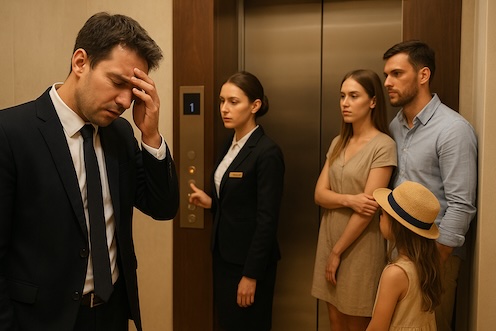During the 2023 Spring Festival,a resort hotel in Sanya that claims to be a "super five-star" hotel encountered a crisis of elevator paralysis.More than 2000 guests were trapped,127 rooms could not be delivered, and cancellations spread like dominoes. Ironically, the trigger for this disaster was actually two German imported elevators worth 20 million yuan - originally a symbol of luxury, but ultimately exposed fatal service shortcomings.

Design Obsession Turns into Operational Nightmare
The hotel management rejected the manufacturer's intelligent floor display and contactless calling solutions for the so-called "pure design", and instead adopted completely invisible buttons. As a result,guests often accidentally trigger alarms,and the front desk has to handle over 300 false alarms every day. What's even more ridiculous is that the sightseeing elevator, in pursuit of a "panoramic view," did not install anti UV glass, resulting in a collective sunburn of the top floor suite guests. The hotel had to urgently purchase 200 sun hats, exposing the drawbacks of blindly worshiping luxury brands.
Structural Defects Expose Hidden Dangers
The investigation found that the crisis was not accidental. The load capacity of hotel elevators is only 1000 kilograms, while most of the industry has a load capacity of 1600 kilograms. During the Spring Festival, more than 60% of the guests are from families, and overloading alarms frequently occur. More seriously, the hotel did not have separate service and guest elevators, resulting in daily competition between baggage handlers and guests for elevators. A guest wrote in a review, "Spending 5000 yuan to stay in a five-star hotel, but having to grab the elevator, is like escaping.
Elevator malfunction triggers chain reaction: delivery time extends from 10 minutes to 2 hours, mini bar consumption drops by 80%; Carrying luggage on carts takes the hotel back to the 1990s; 127 guest rooms were unable to be delivered on time, triggering the automatic compensation mechanism of platforms such as Ctrip, resulting in a direct loss of over one million yuan per day. It wasn't until the topic '# Sanya's Most Disappointing Five Star Hotel #' hit the hot search that the management realized that in the era of social media, a service collapse could destroy decades of brand accumulation.
Elevator Revolution 2.0: Forced Transformation
Under regulatory intervention, hotels have launched the 'Elevator Revolution 2.0'. Complete the deployment of the health monitoring system within 72 hours, sign the domestic manufacturer's full responsibility maintenance contract within 48 hours, and complete employee emergency training within 24 hours. Elevator service has even been included in employee KPIs: the front desk must introduce elevator usage guidelines to guests upon check-in, and the service team must respond to repair requests within 10 minutes.
Turning to domestically produced intelligent elevators has become a turning point. Only two German elevators will be kept for display, and all others will be replaced with domestically produced elevators with contactless calling systems. Guests can make reservations using their mobile phones. Combining the air purification and fragrance system in the elevator hall has become a new service highlight. A regular customer exclaimed, "Now it's time to wait for the elevator and take a trendy check-in photo.
The service earthquake inspiration of the industry
This crisis reminds the entire industry that in the era of experience economy, elevators are no longer just a means of transportation, but a key link in the service chain. Data shows that 62% of elevator complaints directly affect residents' evaluation of overall service. Leading hotels have started systematic renovation:
Technical adaptation: Manufacturers are required to provide high-temperature and high humidity environment testing, full load stability reports, and refuse to blindly follow "European standards".
Risk hedging: Establish a "dual backup" mechanism for key components to ensure operation recovery within 4 hours, and sign emergency agreements with multiple maintenance units.
Experience design: Transform the elevator hall into a service node, equip it with charging ports and first aid kits, and develop an "elevator waiting reminder" mini program to turn passive waiting into active service.
From Crisis to Service Innovation Showcase
Nowadays, this hotel has transformed the elevator hall into a "Service Innovation Exhibition Area". Guests can scan the code to check the real-time health status of the elevator. The concierge will proactively call for a dedicated elevator for families with children, and the hotel's self-made "safety tips" will be displayed on the elevator advertising screen. The industry earthquake triggered by elevators ultimately gave birth to a more mature service concept: in the high-end hotel industry, true luxury is not a brand of imported equipment, but a reverence and control for every service detail.
If you would like to obtain a more detailed solution, please contact us.
